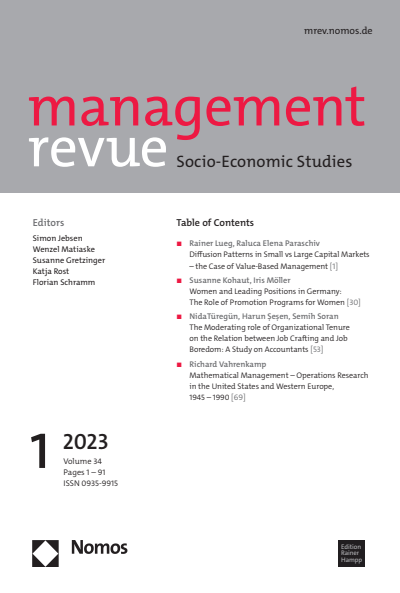问责是双向的:寺院背景下问责与非正式问责实践的意义
IF 1.7
0 MANAGEMENT
引用次数: 0
摘要
结合Schlenker et al.(1994)的问责金字塔和joannidsamos(2012)制定的问责框架,我们对本笃会社区进行了定性研究,以更好地理解非英语环境下问责的本质,并调查帮助本笃会组织维持1500多年的非正式问责实践。研究结果表明,修道院的问责制本质上是积极的,可以被概念化为信徒(交代者)和上帝(最高负责人)之间的社会和道德关系,由修道院领导人支持,确保交代者在日常生活中遵守一定的标准并履行特定的义务。本笃会强调通过实施基于信任、共同价值观和相互尊重的非正式问责实践,制定积极的问责制。通过有关各方之间的公开对话进行评价性询问,通过非正式奖励和制裁进行社会控制,通过公开公告进行个人赞赏,通过定期投入和双向反馈进行集体讨论,以及通过倾听和非正式的信息交流来接近领导者,这些都是非正式问责实践的例子,这些实践指导本笃会的行为朝着实现社区目标的方向发展,也可以被非宗教组织采用。本文章由计算机程序翻译,如有差异,请以英文原文为准。
Accountability is a Two-way Street: The Meaning of Accountability and Informal Accountability Practices in the Monastic Context
Combining Schlenker et al.’s (1994) accountability pyramid with the accountability framework formulated by Joannidés (2012), we conduct a qualitative study of a Benedictine community to better understand the nature of accountability in the non-English speaking context and investigate informal accountability practices that helped to sustain Benedictine organisations for more than 1,500 years. The findings suggest that monastic accountability is positive in its nature and can be conceptualised as a social and moral relationship between a believer (an account giver) and God (the highest principal) supported by the monastic leader(s) making sure that account givers adhere to certain standards and fulfil particular obligations in their daily lives. The Benedictines emphasise positive accountability enactment by implementing informal accountability practices based on trust, shared values, and mutual respect. Evaluative inquiries through an open dialogue between parties involved, social control through informal rewards and sanctions, individual appreciation through public announcements, collective discourse through regular input and two-way feedback, and leader accessibility through listening and informal information exchange are examples of informal accountability practices that guide the behaviour of the Benedictines towards the achievement of community goals and can also be adapted by non-religious organisations.
求助全文
通过发布文献求助,成功后即可免费获取论文全文。
去求助
来源期刊

Management Revue
MANAGEMENT-
CiteScore
1.20
自引率
0.00%
发文量
7
期刊介绍:
Management Revue - Socio-Economic Studies is an interdisciplinary European journal that undergoes peer review. It publishes qualitative and quantitative work, along with purely theoretical papers, contributing to the study of management, organization, and industrial relations. The journal welcomes contributions from various disciplines, including business and public administration, organizational behavior, economics, sociology, and psychology. Regular features include reviews of books relevant to management and organization studies.
Special issues provide a unique perspective on specific research fields. Organized by selected guest editors, each special issue includes at least two overview articles from leaders in the field, along with at least three new empirical papers and up to ten book reviews related to the topic.
The journal aims to offer in-depth insights into selected research topics, presenting potentially controversial perspectives, new theoretical insights, valuable empirical analysis, and brief reviews of key publications. Its objective is to establish Management Revue - Socio-Economic Studies as a top-quality symposium journal for the international academic community.
 求助内容:
求助内容: 应助结果提醒方式:
应助结果提醒方式:


